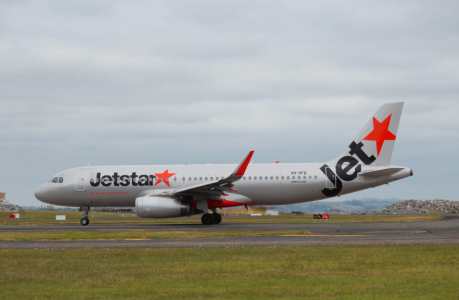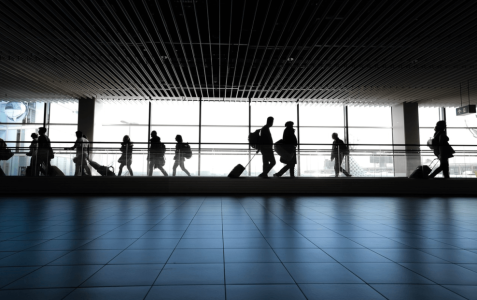Woman's 'degrading' flight after a family funeral ignites anger – What happened?
- Replies 10
It's always difficult to fly away for a funeral. Even more so in the case of Annabel Selby-Jones, who had to fly up to Queensland from Sydney recently to attend her family member's wake.
After bidding her final farewells at a family funeral in Queensland, all she wanted was a smooth trip back to her Sydney home to recover from the emotional toll the day had taken.
Unfortunately, a last-minute cancellation by Jetstar dashed her hopes for a peaceful return journey. This cancellation left her stranded overnight and forced her to spend her own money on various expenses that were suddenly thrust upon her due to the airline's decision.
One month later, Annabel still vents frustration over the incident, particularly regarding the way Jetstar staff handled the situation leading up to the cancellation and the aftermath.
'We left the (funeral) wake early to get to the flight on time,' Annabel said. 'We could have stayed with our family.'
Instead of being with those she loved, Annabel found herself in a hotel with no toiletries, fresh clothing, or adequate provisions. Resigning herself to a meal of nuts from a minibar for dinner, she recalls this experience as nothing short of 'degrading'.

Recalling the sequence of events, Annabel vividly remembers the hours of confusion and frustration that followed the cancellation of her flight. The lack of clear communication from Jetstar staff only compounded her distress during this already challenging time.
Eventually, the stranded passengers were transported to a hotel by bus.
Upon reaching the hotel, each passenger received a meagre $30 food voucher. Unfortunately, by the time Annabel arrived, room service had already ceased for the night, leaving her with no alternative but to rely on the limited options available in her hotel room's minibar, which consisted mainly of nuts.
Adding to the inconvenience, Annabel had only brought hand luggage for what she had anticipated would be a same-day return trip. Consequently, she found herself without clean clothes, toiletries, or personal hygiene items necessary for an unexpected overnight stay.
The following day, Annabel had to incur an additional expense of $35 for an Uber trip back to the Brisbane terminal. To her dismay, she discovered that her rescheduled flight was further delayed, prolonging her arduous journey.
Eventually arriving in Sydney, she was faced with an unforeseen charge of $63 for overnight parking due to the unplanned layover.
In response to the incident, a Jetstar spokesperson expressed their apologies for the inconvenience caused to passengers, including Selby-Jones, due to the cancellation of her flight. The spokesperson attributed the cancellation to the sudden illness of a crew member.
According to the spokesperson, affected customers were promptly rescheduled on the next available flight. Additionally, for those who were away from home, Jetstar arranged accommodations and covered expenses such as meals and other reasonable costs. The airline also ensured that transportation to and from the airport was provided as necessary.

Annabel, a 49-year-old communications executive, strongly feels that her ordeal exposes the weaknesses in Australia's current aviation passenger compensation scheme. She believes that the system fails to hold airlines accountable for their actions and leaves passengers unfairly at the mercy of these carriers.
Arguing for a system similar to the specific compensation levels in place for passengers flying within the European Union, Annabel is confident that this would result in fewer cancellations and delays, as well as improve service within the industry.
'It will cost (airlines) financially,' Selby-Jones said, 'Right now, it's costing (airlines) from a reputation point of view, but it doesn't seem that matters to them.'
Currently, the Australian Competition and Consumer Commission, in collaboration with various consumer advocate groups, is actively urging the federal government to evaluate the possibility of implementing a more comprehensive passenger compensation scheme.
This collective effort aims to push for a better-defined process that ensures appropriate compensation for affected travellers.
To facilitate this initiative, an Aviation White Paper is currently in progress. This document serves as a platform to explore different options and strategies, with the ultimate goal of establishing a more robust and equitable framework for passenger compensation in Australia.
The ongoing discussions and research surrounding the white paper offer hope for positive changes in the aviation industry. If implemented, these improvements would provide greater protection and support for passengers, addressing the inadequacies of the existing system.

Recent monthly data reveals that in March, Jetstar had the highest percentage of flight cancellations among Australian carriers, with a rate of 7.1 per cent. This was followed by Qantas at 3.6 per cent and Virgin Australia at 2.6 per cent. The statistics indicate a concerning trend for Jetstar in terms of flight cancellations during that month.
In February, Jetstar once again had the highest rate of cancellations, accounting for 6.4 per cent of its flights. Comparatively, Qantas had a cancellation rate of 4.4 per cent, and Virgin Australia stood at 3.5 per cent.
The trend continued in January, with Jetstar leading in flight cancellations at a staggering rate of 7.3 per cent. This figure was more than triple the number of flights cancelled by both Qantas and Virgin Australia during the same period.
These statistics highlight the consistent problem of flight cancellations in Jetstar's operations, suggesting the need for improvements in their service reliability. Annabel Selby-Jones' personal encounter further reflects a disheartening experience with the airline.
We would like to hear your thoughts on Annabel's story. Have you or someone you know had a similar experience? While Jetstar has been making efforts to enhance its customer service recently, do you believe these measures are sufficient? Share your opinions in the comments section below!
After bidding her final farewells at a family funeral in Queensland, all she wanted was a smooth trip back to her Sydney home to recover from the emotional toll the day had taken.
Unfortunately, a last-minute cancellation by Jetstar dashed her hopes for a peaceful return journey. This cancellation left her stranded overnight and forced her to spend her own money on various expenses that were suddenly thrust upon her due to the airline's decision.
One month later, Annabel still vents frustration over the incident, particularly regarding the way Jetstar staff handled the situation leading up to the cancellation and the aftermath.
'We left the (funeral) wake early to get to the flight on time,' Annabel said. 'We could have stayed with our family.'
Instead of being with those she loved, Annabel found herself in a hotel with no toiletries, fresh clothing, or adequate provisions. Resigning herself to a meal of nuts from a minibar for dinner, she recalls this experience as nothing short of 'degrading'.

Annabel Selby-Jones faced a last-minute cancellation of her Jetstar flight from Brisbane to Sydney after attending a family funeral. Credit: Unsplash/heartstyle176.
Recalling the sequence of events, Annabel vividly remembers the hours of confusion and frustration that followed the cancellation of her flight. The lack of clear communication from Jetstar staff only compounded her distress during this already challenging time.
Eventually, the stranded passengers were transported to a hotel by bus.
Upon reaching the hotel, each passenger received a meagre $30 food voucher. Unfortunately, by the time Annabel arrived, room service had already ceased for the night, leaving her with no alternative but to rely on the limited options available in her hotel room's minibar, which consisted mainly of nuts.
Adding to the inconvenience, Annabel had only brought hand luggage for what she had anticipated would be a same-day return trip. Consequently, she found herself without clean clothes, toiletries, or personal hygiene items necessary for an unexpected overnight stay.
The following day, Annabel had to incur an additional expense of $35 for an Uber trip back to the Brisbane terminal. To her dismay, she discovered that her rescheduled flight was further delayed, prolonging her arduous journey.
Eventually arriving in Sydney, she was faced with an unforeseen charge of $63 for overnight parking due to the unplanned layover.
In response to the incident, a Jetstar spokesperson expressed their apologies for the inconvenience caused to passengers, including Selby-Jones, due to the cancellation of her flight. The spokesperson attributed the cancellation to the sudden illness of a crew member.
According to the spokesperson, affected customers were promptly rescheduled on the next available flight. Additionally, for those who were away from home, Jetstar arranged accommodations and covered expenses such as meals and other reasonable costs. The airline also ensured that transportation to and from the airport was provided as necessary.

Selby-Jones claims the way Jetstar staff managed the cancellation and aftermath was 'degrading' and left her spending the night at a hotel with no toiletries or clean clothes. Credit: Pixabay/Skitterphoto.
Annabel, a 49-year-old communications executive, strongly feels that her ordeal exposes the weaknesses in Australia's current aviation passenger compensation scheme. She believes that the system fails to hold airlines accountable for their actions and leaves passengers unfairly at the mercy of these carriers.
Arguing for a system similar to the specific compensation levels in place for passengers flying within the European Union, Annabel is confident that this would result in fewer cancellations and delays, as well as improve service within the industry.
'It will cost (airlines) financially,' Selby-Jones said, 'Right now, it's costing (airlines) from a reputation point of view, but it doesn't seem that matters to them.'
Currently, the Australian Competition and Consumer Commission, in collaboration with various consumer advocate groups, is actively urging the federal government to evaluate the possibility of implementing a more comprehensive passenger compensation scheme.
This collective effort aims to push for a better-defined process that ensures appropriate compensation for affected travellers.
To facilitate this initiative, an Aviation White Paper is currently in progress. This document serves as a platform to explore different options and strategies, with the ultimate goal of establishing a more robust and equitable framework for passenger compensation in Australia.
The ongoing discussions and research surrounding the white paper offer hope for positive changes in the aviation industry. If implemented, these improvements would provide greater protection and support for passengers, addressing the inadequacies of the existing system.
Key Takeaways
- Annabel Selby-Jones, a 49-year-old communications executive, was left stranded and frustrated after a last-minute cancellation by Jetstar following a family funeral in Queensland.
- She expressed dissatisfaction with the airline's handling of the situation and the subsequent challenges she faced during an overnight stay, including inadequate provisions and unexpected expenses.
- While Jetstar offered apologies, rebooking, accommodations, and expense coverage, Annabel's account highlights the need for improved communication, support, and compensation frameworks for passengers facing such disruptions.
Recent monthly data reveals that in March, Jetstar had the highest percentage of flight cancellations among Australian carriers, with a rate of 7.1 per cent. This was followed by Qantas at 3.6 per cent and Virgin Australia at 2.6 per cent. The statistics indicate a concerning trend for Jetstar in terms of flight cancellations during that month.
In February, Jetstar once again had the highest rate of cancellations, accounting for 6.4 per cent of its flights. Comparatively, Qantas had a cancellation rate of 4.4 per cent, and Virgin Australia stood at 3.5 per cent.
The trend continued in January, with Jetstar leading in flight cancellations at a staggering rate of 7.3 per cent. This figure was more than triple the number of flights cancelled by both Qantas and Virgin Australia during the same period.
These statistics highlight the consistent problem of flight cancellations in Jetstar's operations, suggesting the need for improvements in their service reliability. Annabel Selby-Jones' personal encounter further reflects a disheartening experience with the airline.
We would like to hear your thoughts on Annabel's story. Have you or someone you know had a similar experience? While Jetstar has been making efforts to enhance its customer service recently, do you believe these measures are sufficient? Share your opinions in the comments section below!







